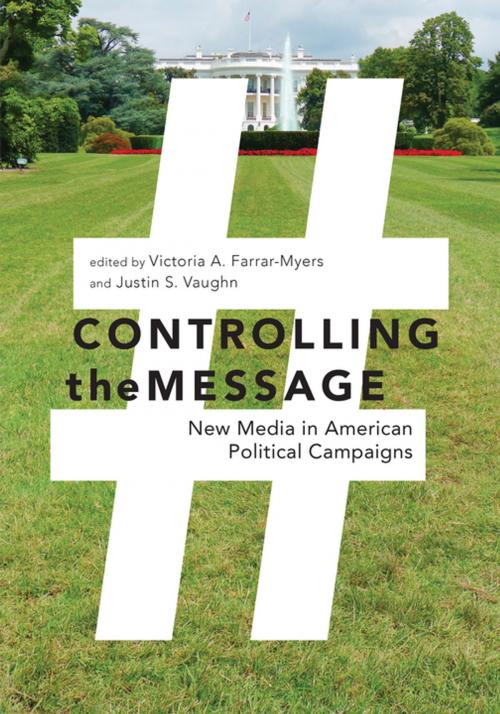Controlling the Message
New Media in American Political Campaigns
Nonfiction, Health & Well Being, Psychology, Mental Illness, Social & Cultural Studies, Political Science, Government, Democracy| Author: | ISBN: | 9781479886630 | |
| Publisher: | NYU Press | Publication: | March 27, 2015 |
| Imprint: | NYU Press | Language: | English |
| Author: | |
| ISBN: | 9781479886630 |
| Publisher: | NYU Press |
| Publication: | March 27, 2015 |
| Imprint: | NYU Press |
| Language: | English |
Choice Outstanding Academic Title of 2016
From the presidential race to the battle for the office of New York City mayor, American political candidates’ approach to new media strategy is increasingly what makes or breaks their campaign. Targeted outreach on Facebook and Twitter, placement of a well-timed viral ad, and the ability to roll with the memes, flame wars, and downvotes that might spring from ordinary citizens’ engagement with the issues—these skills are heralded as crucial for anyone hoping to get their views heard in a chaotic election cycle. But just how effective are the kinds of media strategies that American politicians employ? And what effect, if any, do citizen-created political media have on the tide of public opinion?
In Controlling the Message, Farrar-Myers and Vaughn curate a series of case studies that use real-time original research from the 2012 election season to explore how politicians and ordinary citizens use and consume new media during political campaigns. Broken down into sections that examine new media strategy from the highest echelons of campaign management all the way down to passive citizen engagement with campaign issues in places like online comment forums, the book ultimately reveals that political messaging in today’s diverse new media landscape is a fragile, unpredictable, and sometimes futile process. The result is a collection that both interprets important historical data from a watershed campaign season and also explains myriad approaches to political campaign media scholarship—an ideal volume for students, scholars, and political analysts alike.
Choice Outstanding Academic Title of 2016
From the presidential race to the battle for the office of New York City mayor, American political candidates’ approach to new media strategy is increasingly what makes or breaks their campaign. Targeted outreach on Facebook and Twitter, placement of a well-timed viral ad, and the ability to roll with the memes, flame wars, and downvotes that might spring from ordinary citizens’ engagement with the issues—these skills are heralded as crucial for anyone hoping to get their views heard in a chaotic election cycle. But just how effective are the kinds of media strategies that American politicians employ? And what effect, if any, do citizen-created political media have on the tide of public opinion?
In Controlling the Message, Farrar-Myers and Vaughn curate a series of case studies that use real-time original research from the 2012 election season to explore how politicians and ordinary citizens use and consume new media during political campaigns. Broken down into sections that examine new media strategy from the highest echelons of campaign management all the way down to passive citizen engagement with campaign issues in places like online comment forums, the book ultimately reveals that political messaging in today’s diverse new media landscape is a fragile, unpredictable, and sometimes futile process. The result is a collection that both interprets important historical data from a watershed campaign season and also explains myriad approaches to political campaign media scholarship—an ideal volume for students, scholars, and political analysts alike.















